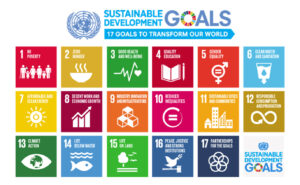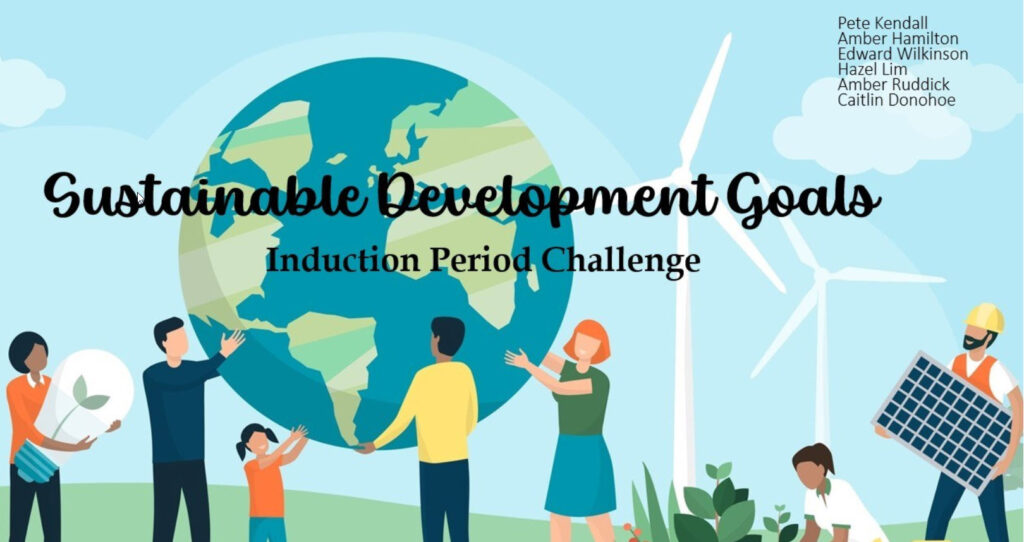Dr Helen Mason, (Lecturer), and Gabrielle Vallons (Peer Mentor Co-ordinator)
School of Biomedical, Nutritional and Sports Science and Liaison and Academic Services (Library)
FMS and Academic Services
What did you do?
The Peer Mentor Induction Period Challenge on Sustainable Development Goals (SDG) was incorporated into a stage 1 lecture on Global Food Security that is delivered to students studying Nutrition and Dietetics. The stage 1 students are encouraged to work with their Peer Mentor to develop a group proposal related to one or more of the nutrition-related SDGs that is then submitted to the Peer Mentor Induction Period Challenge.
Who is involved?
The challenge forms part of the lecture on Global Food Security for stage 1 nutrition and dietetics students, delivered by Dr Helen Mason. The Peer Mentoring scheme is led by Gabrielle Vallons and the SDG Peer Mentoring Induction Period Challenge is run by Newcastle University Liaison and Academic Services.
How did you do it?
Before the induction period, the Staff Coordinator for the peer mentoring scheme in nutrition and dietetics has a meeting with the new stage 2/3 Peer Mentors to discuss the SDG Peer Mentor Induction Challenge and how the SDGs link to the field of food and nutrition, such as reducing food insecurity, reducing food-related waste, improving education and/or improving accessibility to affordable nutritious food. During induction the stage 1 nutrition and dietetics students have their initial meeting with their Peer Mentor, part of which is assigned to initiate a discussion about the SDG Challenge. This is consolidated in the third week of teaching when the stage 1 students have a lecture on Global Food Security as part of the Introduction to Nutrition module.
Within this lecture students cover the United Nations SDGs in more depth, and are reminded of the SDG Peer Mentor Induction Challenge. Throughout the process students are encouraged to develop creative and innovative solutions to an identified issue on campus, and to use alternative creative digital formats to deliver their proposal. Each group’s proposal is then submitted by the Peer Mentor to the SDG Peer Mentor Induction Challenge, and by the stage 1 students as a formative assignment on the module.

The UN’s Sustainable Development Goals
Why did you do it?
In the 21st century both developed and developing countries experience the Double Burden of Malnutrition (DBM). This term recognises the co-existence of under- and over-nutrition within the same population that can severely impact the lifelong health outcomes of individuals. Issues surrounding under- and over-nutrition link to several of the United Nations Sustainable Development Goals (SDG) including SDG2 zero hunger, SDG3 good health and well-being, SDG4 quality education, SDG6 clean water and sanitation, SDG11 sustainable cities and communities and SDG12 responsible consumption and production.
The incorporation of the SDG Peer Mentoring Induction Challenge into the lecture on Global Food Security at an early stage of the degree programme encourages the nutrition and dietetics students to look more deeply into the challenges communities face when making healthy and sustainable food choices, and how those choices encompass all aspects of the global food chain. The emphasis on developing a proposal for Newcastle University to implement encourages our students to look at local issues and to develop a proposal that will educate and inform other students across the university about nutrition, health and sustainable food choices.
The project is student-led which enables the winning teams to be pro-active in changing their society for the better. The link with Nijmegen School of Management, Radboud University (Netherlands) facilitates a global view and enables students to see that what may be perceived as a local issue is often a common global one that may be addressed by forming networks, facilitating discussion and developing a universal plan thereby encouraging global change.
Does it work?
Yes, it did! Out of 12 Nutrition and Dietetics Peer Mentors, 10 submitted an entry to the competition and out of these 10, two groups were shortlisted and won first and third prize respectively. Not only did the challenge help students to make friends and learn about the UN’s Sustainable Development Goals, but plans are now in place to take their ideas forward and be developed by the University which could have lasting impact across the student body. It is great to see the impact that our Peer Mentors are having not just on their mentees, but also on the wider University, and the effect taking part in the scheme has on the Peer Mentors’ personal and professional development.

Newcastle University’s 3rd prize winners’ presentation
All winning entries can be viewed in this presentation.
Student Voice
Students provided feedback on the SDG Peer Mentor Induction Challenge:
The challenge provided a chance for us to work towards something we’re all passionate about, whilst also contributing towards solving a major global problem. For these reasons, it felt more like an opportunity than a challenge. If our idea is implemented effectively, the magnitude of the potential positive impact on the environment is immense. And not only may the health of the planet improve, but also the health of thousands of students for years to come!
Jacob Hamilton (Peer Mentor in Stage 2, Dietetics) – First Prize WinnerOur group tried to focus on topical, on-trend problems and prioritised finding a realistic solution, that could be scaled up, over a farfetched one. Hopefully our winning idea will inspire others to take action and see that small projects can make a huge difference in making the world a more sustainable place. Throughout the project and as my wider role as a Peer Mentor, I have developed my teamwork, communication and leadership skills, through leading group discussions, delegating tasks and bringing the team together. I also improved my organisation skills, by planning and coordinating meetings, and presentation skills when pitching our idea to the judging panel and audience.
Caitlin Donohoe (Peer Mentor in Stage 2, Dietetics) – Third Prize WinnerThe challenge informed me about problems faced by others in the wider world and made me think about what I can do to help with troubling situations. Taking part in the challenge also allowed me to make friends with the people in my mentee group.
Edward Wilkinson (Stage 1 Mentee, Food and Human Nutrition) – Third Prize Winner
The Graduate Framework
The SDG Peer Mentor Induction Challenge demonstrated the following attributes:
- Socially responsible
- Future focused
- Critical thinkers
- Creative, innovative and enterprising
- Digitally capable
- Curious
- Collaborative
- Engaged
Interested in finding out more?
The Peer Mentor training includes guidance for students on how to identify and articulate the transferable skills they are developing through the role for their CV and student feedback shows that students can see evidence of these attributes being developed through the challenge.
The Peer Mentoring webpages provide information on the University’s Peer Mentoring scheme, including information for staff and current students as well as prospective students who may want to find out more about what to expect from their Peer Mentor before their arrival at University.
Information for Peer Mentors and their mentees regarding the SDG Induction Period Challenge was provided via a dedicated webpage. This page included information about the competition as well as access to teaching materials and guides which were released consecutively during the induction period to help them to complete the challenge. Visit the SDG Induction Period Challenge webpage here.
